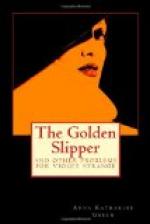When the doctor came that night she had a quiet word with him outside Mrs. Postlethwaite’s door. Was that why he was on hand when old Mr. Dunbar stole from his room to make his nightly circuit of the halls below? Something quite beyond the ordinary was in the good physician’s mind, for the look he cast at the old man was quite unlike any he had ever bestowed upon him before, and when he spoke it was to say with marked urgency:
“Our beautiful young lady will not live a week unless I get at the seat of her malady. Pray that I may be enabled to do so, Mr. Dunbar.”
A blow to the aged man’s heart which called forth a feeble “Yes, yes,” followed by a wild stare which imprinted itself upon the doctor’s memory as the look of one hopelessly old, who hears for the first time a distinct call from the grave which has long been awaiting him!
A solitary lamp stood in the lower hall. As the old man picked his slow way down, its small, hesitating flame flared up as in a sudden gust, then sank down flickering and faint as if it, too, had heard a call which summoned it to extinction.
No other sign of life was visible anywhere. Sunk in twilight shadows, the corridors branched away on either side to no place in particular and serving, to all appearance (as many must have thought in days gone by), as a mere hiding-place for clocks.
To listen to their united hum, the old man paused, looking at first a little distraught, but settling at last into his usual self as he started forward upon his course. Did some whisper, hitherto unheard, warn him that it was the last time he would tread that weary round? Who can tell? He was trembling very much when with his task nearly completed, he stepped out again into the main hall and crept rather than walked back to the one great clock to whose dictum he made it a practice to listen last.
Chattering the accustomed words, “They say Yes! They are all saying Yes! now; but this one will say No!” he bent his stiff old back and laid his ear to the unresponsive wood. But the time for no had passed. It was Yes! yes! yes! yes! now, and as his straining ears took in the word, he appeared to shrink where he stood and after a moment of anguished silence, broke forth into a low wail, amid whose lamentations one could hear:
“The time has come! Even the clock she loves best bids me speak. Oh! Arabella, Arabella!”
In his despair he had not noticed that the pendulum hung motionless, or that the hands stood at rest on the dial. If he had, he might have waited long enough to have seen the careful opening of the great clock’s tall door and the stepping forth of the little lady who had played so deftly upon his superstition.
He was wandering the corridors like a helpless child, when a gentle hand fell on his arm and a soft voice whispered in his ear:
“You have a story to tell. Will you tell it to me? It may save Miss Postlethwaite’s life.”




